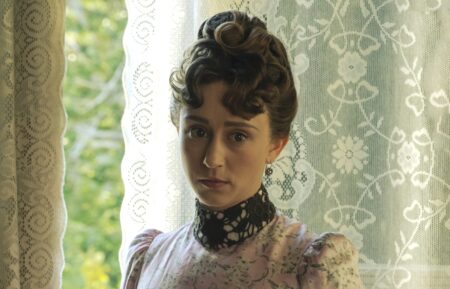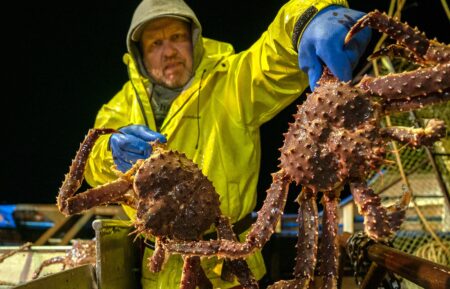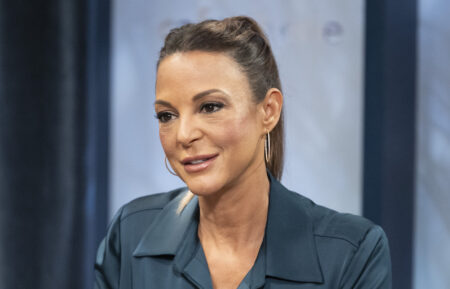Outlander Finale: Did the Show Go Too Far?
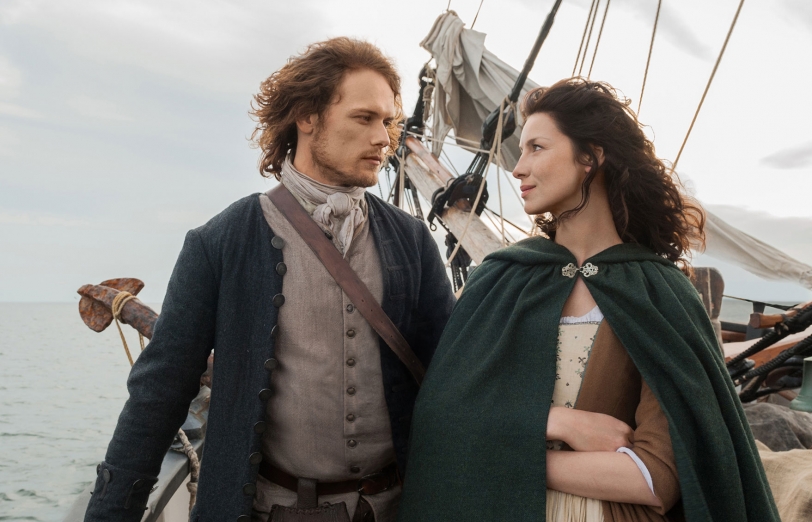
In the Season 1 finale of Outlander, sadistic Black Jack Randall (Tobias Menzies) finally got his way and raped Jamie Fraser (Sam Heughan) body and soul. The brutal physical and emotional abuse was unlike anything we have ever seen on television. Mercifully, these scenes alternated with ones showing Jamie’s rescue and recovery as Claire’
How did you approach shooting the scenes between Jack and Jamie?
There were big things we did that were outside the usual. We carved out extra time for the actors to work with the director Anna Foerster in rehearsals. It was important that they have the time and the space to work through all those scenes in [the final two] episodes. Because of the nature of what we were doing we wanted to give them space and freedom, and to create a zone where they could really do their best work. We built the prison set on our soundstages and then we shot in story order chronologically, as opposed shooting it out of sequence. This was to help the actors maintain where they were in the story and give them the whole story arc.
What conversations did you have with Menzies and Heughan?
We talked about: Wha
What changes did the actors suggest?
There’s a scene where Jack kind of pulls Jamie up into his lap and Jamie is spread out a little bit and Jack says, “Oh, you’re going to submit like Christ on the cross. And he kind of holds out his hands in that shot. With their body positions it kind of reminds you of Michelangelo’s Pieta, the sculpture. It’s Christ. And it’s affecting, transgressive, powerful and moving all at the same time. The director really liked it. So we added that line and kept it in the show.
Why did you structure the episode the way you did—moving between Claire caring for Jamie as he recovers in the monastery and flashbacks to the prison scenes?
One, in the book the whole story was told in flashback and maintained Claire’s first person narrative. The things that happened in Wentworth with
Jamie’s shame-filled revelation of that secret was heartbreaking. Why did he feel so guilty about that moment when Jack, as Jamie put it, “made love” to him?
It was a moment amid all the pain, all the torture of it where he felt okay. Where he almost enjoyed it. And the fact that it came in the context of relief, that there was a moment of comfort in his heart, he feels guilty about that. Because he’s bought into the idea that he’s not supposed to. And that certainly has reverberations in our own culture of rape victims who start feeling like their experience was particularly bad because they didn’t feel or react in the way they were, “supposed” to react. It causes a lot of feelings of guilt, of self-flagellation, of self-loathing.
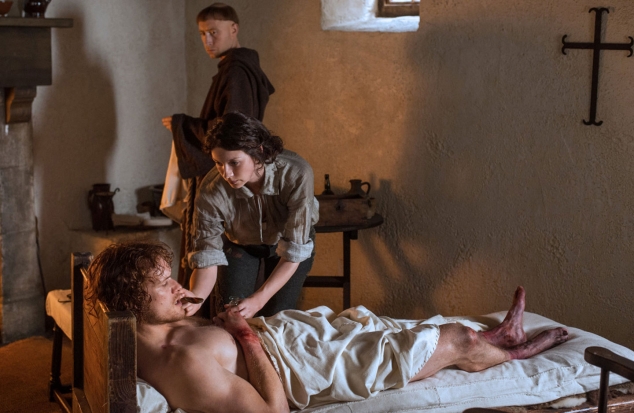
So many sad and awful things happened in that single hour of television. Were you worried fans would tune out?
Look, it’s tough stuff. It’s a horrible story we’re telling. We were going to tell it. We were going to face it. We were going to try to do it as truthfully as we could. But I was trying to figure out: What’s the point where I can’t watch the show anymore, where I have to look away? Whenever I found that place, I’d say, OK, let’s cut or change it, or move to the next scene. I have no problem making the audience deeply uncomfortable and upset. But I didn’t want to lose them. I didn’t want them to turn it off and say, “That’s too much.” There will be people who feel that regardless. I get it. But I didn’t want the vast majority to not be able to watch. I wanted them to be horrified, moved, affected, upset, but I didn’t want them to walk away and hopefully that’s the place that I found.
How do you decide when a moment is too much?
The choices have to do with how much violence you depict on camera and for how long. Sometimes it’s literally just a frame or two or a split second. How long do look at that nail in the hand or watch Jack literally raping Jamie? How many screams do you hear? You feel it going in to this place where you say, that’s too much. Sometimes if you create quiet before or after that moment it makes the image itself work better.
What did you think when you saw the actors’ final performances?
I was proud of both of them. Sam really stepped up and got to the heart of this man and his trauma. It was fearless. The thing that impressed me the most about Tobias was that Jack never stopped being a human being. Jack was a man. He wasn’t a monster. He wasn’t just some fantastical creation that you could dismiss. And it’s more horrific because he’s a man. Human beings come up with these kinds of things and do this to one another. If he’d let Jack lapse into some cardboard cutout villain then none of the scenes would carry the kind of power that they do. Both actors were fearless and vulnerable and really brave.
It seems like male rape scenes are more difficult for people to stomach. Why do you think that is?
The thought of male rape has a particular taboo in our culture. We tend to wall it off behind prison walls in our heads. We make prison jokes about it. And that’s about it. To portray it, to really go for it, especially to take your male lead character there is just something that we as a culture really recoil from … When I read it, I remember going, wow I’ve never seen this stuff before and if we do this it will be something different.
Critics suggest shows like Game of Thrones use rape and torture to amp up storylines. Where do you stand on that?
Game of Thrones is so high profile. As a result, when something happens on there, it causes a lot more chatter. Do I think television as a whole is using violence or rape more than it ever has? No. It’s always been a staple of television. Maybe it’s portrayed more graphically now. Maybe it’s lingered on more now. Maybe premium cable goes to places that broadcast television couldn’t, wouldn’t even think about doing 25 years ago. But if you went back, you would see that rape and violence were constantly part of storylines since the dawn of television. They just handled them differently. The morays of the time were different. The way TV told stories was different. But it was always a story point. It was always a threat that was being used. I don’t see that this is a new trend. The violence on Game of Thrones is certainly not more over the top than what they were doing on Spartacus just a few years ago. Not by a long shot.
Have Claire and Jamie escaped Jack for good? Will we only see Menzies again in his other Outlander role as Claire’s 20th century husband, Frank?
You will have to wait and see. You will see Tobias. We will be flashing back—or flashing forward, however you want to put it—to the 20th century and seeing more of Frank.
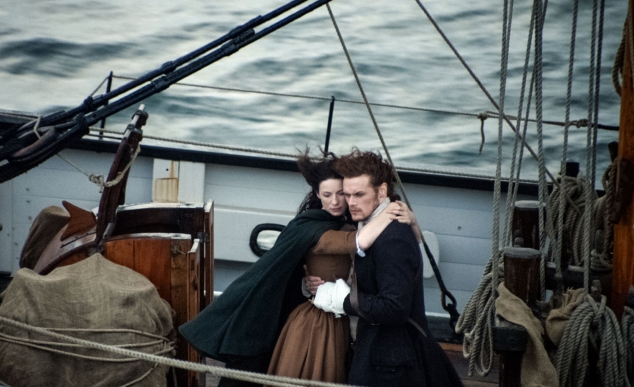
In the last scene, Claire and Jamie sail off to France and she shares her happy news. Why did you end the season that way?
The first book ends on that note. I think the last line of the book is “I’m pregnant.” But in the book, when Claire takes Jamie to recover in the monastery—that was already in France. A lot of that story we moved back to Scotland because I wanted to maintain the sense of them being in jeopardy and not quite being free yet. That enabled us to do the very last scene on the ship, sailing away to France.
Will the second season focus on Claire’s pregnancy?
The pregnancy, staying in the 18th Century and what that means for Claire, is a significant story in the second year.
How will the trauma of Jamie’s rape affect them long-term?
There will definitely be reverberations of it for him and for the relationship into the second season—and beyond. In the book series, the character of Jamie Fraser never lets go of this experience. Author Diana Gabaldon is in the eighth book and there are times when he still remembers; it still haunts him. It doesn’t dominate the story in the second season or in the books but it is always part of his character. It comes up in unexpected ways and it affects the relationship with Claire for the rest of their lives.
From TV Guide Magazine
How 'Countdown' Recruited Jensen Ackles to Go Full 'Die Hard'
Countdown boss Derek Haas talks creating the character around Ackles, and the cast teases the “Avengers”-like team of the crime thriller. Read the story now on TV Insider.






